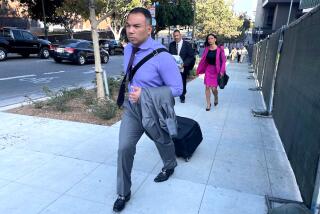Jeweler agrees to plead guilty in KPMG insider-trading case
A San Fernando Valley jeweler has agreed to plead guilty to conspiracy for allegedly making illegal stock trades based on inside information given to him by a KPMG partner.
Bryan Shaw, 52, of Lake Sherwood admitted in a plea agreement that he conspired in the case with KPMG’s Scott London, making $1.27 million in trading profits thanks to information that London allegedly provided about KPMG clients. Under the deal, Shaw agreed to give up those profits by paying them to the government.
Federal prosecutors had earlier charged London, 50, with conspiracy to commit insider trading. London, who was fired by the firm last month, is scheduled to be arraigned May 17 in U.S. District Court in Los Angeles.
Shaw admitted in his plea agreement that he gave London more than $60,000 in cash in exchange for confidential information about KPMG’s clients, typically meeting with London near Shaw’s Encino jewelry store to give him stacks of $100 bills. Shaw also said he gave London a $12,000 Rolex Daytona Cosmograph watch, as well as jewelry and concert tickets, in exchange for the confidential information.
London was a senior partner at KPMG who supervised hundreds of accounting professionals at the firm and personally handled audits of major KPMG clients, including Herbalife Ltd. and Skechers USA Inc. In his position, London had access to confidential information about KPMG’s clients before that information was disclosed to the public.
KPMG resigned as the auditor of Herbalife and Skechers after learning of London’s conduct. Skechers has hired a new accountant. Herbalife has been searching for a replacement.
Shaw has been cooperating with the government’s investigation since February. He helped authorities secretly record conversations he had with London and allowed FBI agents to photograph him making a cash payment to London.
London, in some instances, called Shaw two to three days before news releases were issued for KPMG clients and read confidential information from the draft releases to Shaw, according to court documents. London allegedly also disclosed to Shaw confidential information about impending mergers concerning KPMG clients before that information was made public. London also advised Shaw how to structure Shaw’s purchases of stock in certain companies in order to protect them from being discovered.
ALSO:
Gambling at U.S. casinos rose in 2012, report says
Wine prices climb as demand puts squeeze on supplies
How I Made It: Candace and Charles Nelson of Sprinkles
Follow Stuart Pfeifer on Twitter
More to Read
Inside the business of entertainment
The Wide Shot brings you news, analysis and insights on everything from streaming wars to production — and what it all means for the future.
You may occasionally receive promotional content from the Los Angeles Times.











